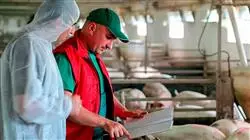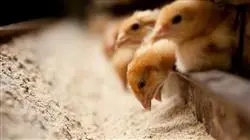University certificate
The world's largest faculty of veterinary medicine”
Introduction to the Program
A complete and total update in Animal Production and Health with the most complete and effective training program on the online educational market"

The globalization that has emerged in recent years and its relationship with animal health and, therefore, with public health, is a topic of worldwide interest. The increase in international trade and structural changes in the State have favored the emergence and spread of global health phenomena that represent risks, challenges and opportunities for producers and consumers. This is turn has posed serious challenges for health agencies, professionals and educational institutions.
Within the concept of globalization where this module arises, the student will be able to analyze the concept of "One Health", examining the contribution of veterinarians to this concept which is of such great importance on a global level. Similarly, the veterinarian will identify organizations such as FAO and OIE and their functions.
The rational use of natural capital in any profession requires the training of highly competitive professionals with clear bioethical principles, knowledge of the laws of nature and who are committed to sustainable human development.
The first part of the module analyzes the different implications of ecology in animal health by analysing population ecology, environmental impact and the use of natural resources in sustainable development in different animal species of economic importance and wild species.
The second part of the module - “Animal Welfare” - focuses on the different implications of the well-being of animals. This part of the module aims to provide the professional with specialized knowledge about the proper functioning of the organism, the behavioral state, and the requirements and needs, focused on the measurement of Wellness.
It also develops the necessary skills to provide advice and guidance on the various aspects related to the science of Animal Welfare, analyzing the scientific, legislative and ethical foundations.
The veterinary professional will be able to propose preventive measures, as well as to solve the main problems generated by welfare deficiencies in different animals.
Join the elite, with this highly effective educational training and open new paths to help you advance in your professional progress"
This Postgraduate diploma in Animal Production and Health contains the most complete and up-to-date scientific program on the market. The most important features include:
- The latest technology in online teaching software
- A highly visual teaching system, supported by graphic and schematic contents that are easy to assimilate and understand
- Practical cases presented by practising experts
- State-of-the-art interactive video systems
- Teaching supported by telepractice
- Continuous updating and recycling systems
- Autonomous learning: full compatibility with other occupations
- Practical exercises for self-evaluation and learning verification
- Support groups and educational synergies: questions to the expert, debate and knowledge
- Communication with the teacher and individual reflection work
- Content available from any fixed or portable device with internet connection
- Supplementary documentation databases are permanently available, even after the course
A complete training program that will allow you to acquire the most advanced knowledge in all the areas of intervention of a specialized veterinarian"
Our teaching staff is made up of professionals from different fields related to this specialty. In this way we ensure that we deliver the educational update we are aiming for. A multidisciplinary team of professionals trained and experienced in different environments, who will develop the theoretical knowledge in an efficient way, but above all, they will bring their practical knowledge from their own experience to the course: one of the differential qualities of this training.
The efficiency of the methodological design of this Professional Master's Degree, enhances the student's understanding of the subject. Developed by a multidisciplinary team of e-learning experts, it integrates the latest advances in educational technology. This way, you will be able to study with a range of comfortable and versatile multimedia tools that will give you the operability you need in your training.
The design of this program is based on Problem-Based Learning: an approach that conceives learning as a highly practical process. To achieve this remotely, we will use telepractice learning: with the help of an innovative interactive video system, and learning from an expert, you will be able to acquire the knowledge as if you were actually dealing with the scenario you are learning about. A concept that will allow you to integrate and fix learning in a more realistic and permanent way.
With the experience of working professionals and the analysis of real success stories, in a high-impact training approach"

With a methodological design based on proven teaching techniques, this innovative course will take you through different teaching approaches to allow you to learn in a dynamic and effective way"
Why study at TECH?
TECH is the world’s largest online university. With an impressive catalog of more than 14,000 university programs available in 11 languages, it is positioned as a leader in employability, with a 99% job placement rate. In addition, it relies on an enormous faculty of more than 6,000 professors of the highest international renown.

Study at the world's largest online university and guarantee your professional success. The future starts at TECH”
The world’s best online university according to FORBES
The prestigious Forbes magazine, specialized in business and finance, has highlighted TECH as “the world's best online university” This is what they have recently stated in an article in their digital edition in which they echo the success story of this institution, “thanks to the academic offer it provides, the selection of its teaching staff, and an innovative learning method aimed at educating the professionals of the future”
A revolutionary study method, a cutting-edge faculty and a practical focus: the key to TECH's success.
The most complete study plans on the university scene
TECH offers the most complete study plans on the university scene, with syllabuses that cover fundamental concepts and, at the same time, the main scientific advances in their specific scientific areas. In addition, these programs are continuously being updated to guarantee students the academic vanguard and the most in-demand professional skills. In this way, the university's qualifications provide its graduates with a significant advantage to propel their careers to success.
TECH offers the most comprehensive and intensive study plans on the current university scene.
A world-class teaching staff
TECH's teaching staff is made up of more than 6,000 professors with the highest international recognition. Professors, researchers and top executives of multinational companies, including Isaiah Covington, performance coach of the Boston Celtics; Magda Romanska, principal investigator at Harvard MetaLAB; Ignacio Wistumba, chairman of the department of translational molecular pathology at MD Anderson Cancer Center; and D.W. Pine, creative director of TIME magazine, among others.
Internationally renowned experts, specialized in different branches of Health, Technology, Communication and Business, form part of the TECH faculty.
A unique learning method
TECH is the first university to use Relearning in all its programs. It is the best online learning methodology, accredited with international teaching quality certifications, provided by prestigious educational agencies. In addition, this disruptive educational model is complemented with the “Case Method”, thereby setting up a unique online teaching strategy. Innovative teaching resources are also implemented, including detailed videos, infographics and interactive summaries.
TECH combines Relearning and the Case Method in all its university programs to guarantee excellent theoretical and practical learning, studying whenever and wherever you want.
The world's largest online university
TECH is the world’s largest online university. We are the largest educational institution, with the best and widest online educational catalog, one hundred percent online and covering the vast majority of areas of knowledge. We offer a large selection of our own degrees and accredited online undergraduate and postgraduate degrees. In total, more than 14,000 university degrees, in eleven different languages, make us the largest educational largest in the world.
TECH has the world's most extensive catalog of academic and official programs, available in more than 11 languages.
Google Premier Partner
The American technology giant has awarded TECH the Google Google Premier Partner badge. This award, which is only available to 3% of the world's companies, highlights the efficient, flexible and tailored experience that this university provides to students. The recognition as a Google Premier Partner not only accredits the maximum rigor, performance and investment in TECH's digital infrastructures, but also places this university as one of the world's leading technology companies.
Google has positioned TECH in the top 3% of the world's most important technology companies by awarding it its Google Premier Partner badge.
The official online university of the NBA
TECH is the official online university of the NBA. Thanks to our agreement with the biggest league in basketball, we offer our students exclusive university programs, as well as a wide variety of educational resources focused on the business of the league and other areas of the sports industry. Each program is made up of a uniquely designed syllabus and features exceptional guest hosts: professionals with a distinguished sports background who will offer their expertise on the most relevant topics.
TECH has been selected by the NBA, the world's top basketball league, as its official online university.
The top-rated university by its students
Students have positioned TECH as the world's top-rated university on the main review websites, with a highest rating of 4.9 out of 5, obtained from more than 1,000 reviews. These results consolidate TECH as the benchmark university institution at an international level, reflecting the excellence and positive impact of its educational model.” reflecting the excellence and positive impact of its educational model.”
TECH is the world’s top-rated university by its students.
Leaders in employability
TECH has managed to become the leading university in employability. 99% of its students obtain jobs in the academic field they have studied, within one year of completing any of the university's programs. A similar number achieve immediate career enhancement. All this thanks to a study methodology that bases its effectiveness on the acquisition of practical skills, which are absolutely necessary for professional development.
99% of TECH graduates find a job within a year of completing their studies.
Postgraduate Diploma in Animal Production and Health
The care in animal production is a point of great value for the development of the livestock and commercial sector. For this reason, it is essential that professionals in this branch of knowledge are properly qualified to ensure a service with the highest quality standards. At TECH Global University, we understand perfectly the relevance of having prepared individuals, therefore, we have designed the Postgraduate Diploma in Animal Production and Health as an excellent opportunity for professional training. In this program of 450 academic hours, you will have access to first-quality contents, through which you will create an innovative conceptual background that will allow you to develop with total security in daily practice. In addition, upon graduation you will have the necessary skills to design and implement strategies for optimal nutrition and feeding of various species of economic, domestic and wildlife importance.
100% online postgraduate program in Animal Production and Health
This TECH program has been designed by the best specialists in the field, and thanks to this, you have the possibility of accessing new thematic axes, which will allow you to acquire high-quality knowledge in the following topics: feeding, key aspects in production, ecology and welfare of species, among other areas of great interest for a training with the necessary technical and theoretical skills in this veterinary discipline. On the other hand, you will know the current regulations in-depth, as well as the state agencies that guarantee the care of the environment, using them for the promotion and resolution of local problems in animal protection.







